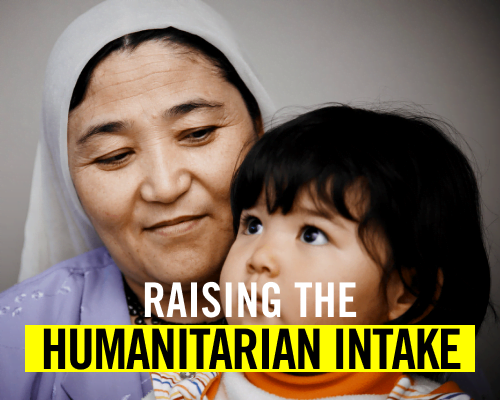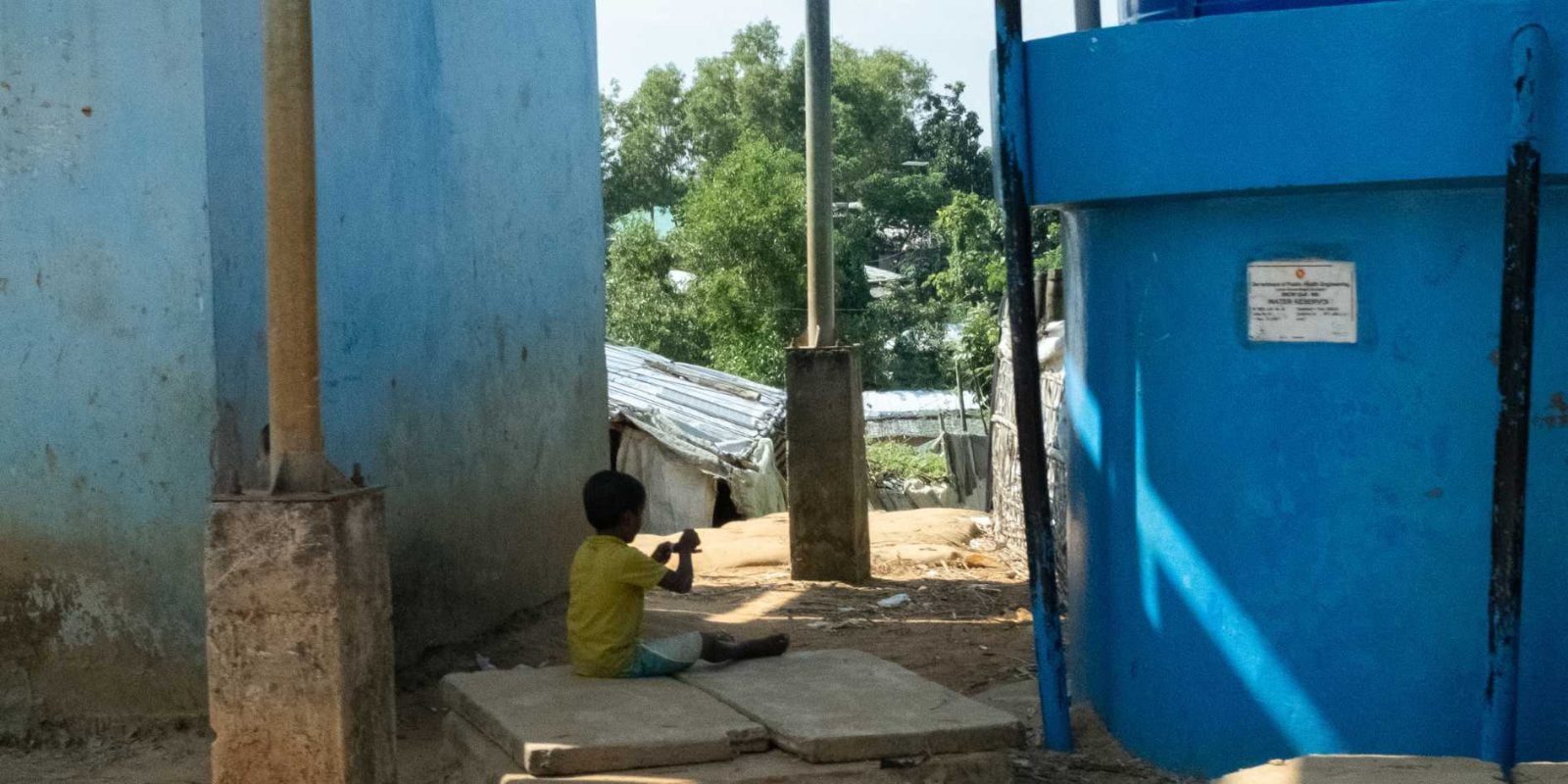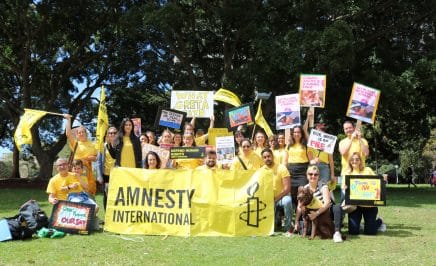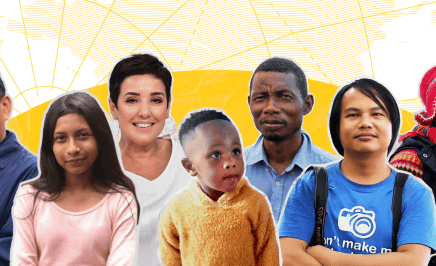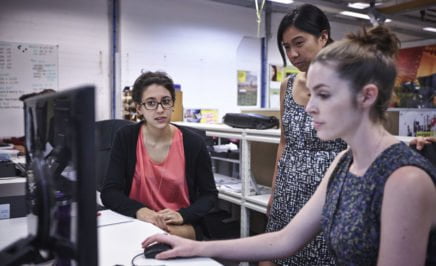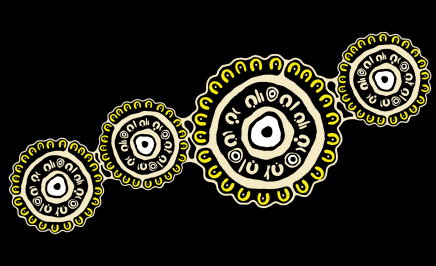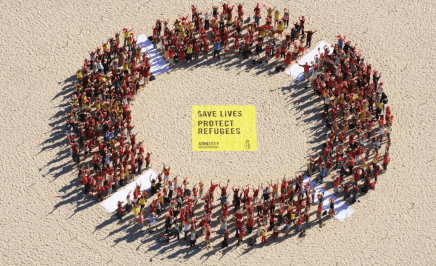The crises that are taking place in countries such as Ukraine, Afghanistan and Myanmar have resulted in more than 120 million people currently displaced around the world. That means that one in every 73 people on earth has been forced to flee their homes.
Despite this harrowing reality, Australia is turning its back. In 2020, the previous Australian Government cut 5,000 places from Australia’s Refugee and Humanitarian Program – bringing Australia’s official intake to just 13,750 places annually. This is one of the lowest levels in 45 years, during a time when the need for resettlement has never been greater.
In contrast, countries such as the United States are committing to resettling 125,000 refugees every year and Canada who are committing to resettling 50,000.
Before the last election, the Albanese Government committed to increasing the Refugee and Humanitarian Program to 27,000 places annually, as well as making an additional 5000 places available through the Community Sponsorship Program. This is welcomed, but Australia can do so much more.
The new Albanese Government must increase the annual Refugee and Humanitarian Program to at least 40,000 places – prioritising people selected by the United Nations High Commissioner on Refugees, as well as ensuring their promised reforms to the Community Sponsorship Program.
Amnesty’s campaigns
At Amnesty, we gather evidence on human rights crises, investigate the situations of vulnerable people on the move, and our global Amnesty movement pushes governments to uphold the rights of refugees and asylum seekers.
In Australia, Amnesty also works to support refugees and asylum seekers by campaigning for the Australian Government to help more people rebuild their lives in safety. Our campaigning is focused on three key asks;
- Raise the refugee and humanitarian intake to 30,000 places a year in total – prioritising people selected by the United Nations High Commissioner on Refugees and 10,000 more places under the Community Sponsorship Program.
- Make refugee sponsorship affordable and accessible, to ensure that sponsorship expands how many people Australia helps find a safe place to live.
- End offshore detention and immediately bring the refugees and asylum seekers in PNG to safety in Australia.
We will be putting pressure on the government between now and the next election to ensure they commit to raising the Refugee and Humanitarian intake. We need your help to do this!
WHAT CAN YOU DO?
Understanding the Issue
Australia has shown leadership on many occasions in response to the crises unfolding in the Asia-Pacific region and beyond, from the Tiananmen square massacre – allowing thousands of Chinese students studying in Australia to stay and build new lives – to the Vietnam refugee crisis between 1978-82, in which Australia resettled refugees at a scale larger than any other country per-capita. In recent years, successive Australian governments have provided additional places to refugees fleeing persecution from Syria, Iraq and Afghanistan. Despite this history as a key resettlement country, Australia has practised a policy of deterrence and punishment towards those seeking protection by sea, particularly in the last three decades.
The marginalisation and politicisation of Australian asylum policy can be traced back further but became particularly prevalent during the Tampa Affair in 2001 when a Norwegian freighter rescued 433 people seeking asylum who were stranded off the Australian coast. The Australian Government was refusing to conduct any rescue missions on the basis that they could then claim asylum in Australia. This event can be seen as one event that sparked the Australian Government designating its first offshore detention facility in Nauru to detain and punish hundreds of people seeking asylum, to a point where they had no choice but to go back to the persecution they originally fled from.
THE CURRENT ISSUE
The current policy of the Australian Government is to practice boat push backs, where ‘at sea’ operations are secret, whistleblowers are criminalised and journalists and non-government organisations cannot visit Australia funded centres offshore. A key provision of this policy is that no person who arrives in the country by boat seeking asylum can ever settle in Australia. Instead, anyone who arrives by boat is forcibly taken by the Government of Australia to offshore ‘Regional Processing Centres’. Although Australia has ended its arrangement with Papua New Guinea regarding offshore processing a new Memorandum of Understanding was signed with Nauru at the end of 2021, which will see the policy continue.
WHAT NEEDS TO BE DONE?
Australia must shift away from an approach solely focused on deterrence and punishment to one that is more nuanced and clearly reflects the priorities and issues facing others in the region and globally. What is needed now is greater coordination of both existing and additional initiatives that combine aid, diplomatic efforts and humanitarian assistance in a more holistic approach. Expanding opportunities for safe and ‘legal’ entry to Australia has been consistently identified as a way for Australia to engage in an alternative, human rights-based policy response to flight by sea. These opportunities include Australia taking on a greater share of resettlement and working with others in the region to ensure all countries are working towards increased resettlement.
STAY INFORMED
- Our Misinformation and Disinformation guide
- If you need help setting up a zoom meeting/would like access to our professional account, just ask us. Please add these into the host an event form so the Supporter Care Team can fulfil your resourcing requests.
- This event template could be useful for you and your group when planning your event. You can follow the same steps as for an online event. However keep in mind that you will be running the event in person so you will need to think of other items such as venues.
- Our events checklist can be a helpful way to make sure your event goes smoothly.
- How to make your Virtual Event inclusive.
HAVE CONVERSATIONS WITH FRIENDS, FAMILY, COLLEAGUES AND FELLOW ACTIVISTS
As an ally, one of the most powerful things you can do is have conversations with friends, family and your neighbours. By speaking out, you can allow others to learn, reflect and act. You’re also standing up for what you believe in – empathy, compassion and fairness. It’s virtual that we build up mass support around our campaigns, and face-to-face conversations are still one of the most effective ways of doing this. Check out our resource on Understanding Refugee Rights: Combatting misinformation and disinformation which teaches you how to have a meaningful conversation about raising the intake. Our guide on structured conversations also helps you develop your persuasive skills.
TAKE URGENT ACTION
- Share and sign the petition: so we can hand over all of the signatures to the government in October
- Collect offline petition signatures: so we can increase these signatures before the handover
- Attend a community connection event: Please keep an eye out for these nights and how to join via the Activism Planner. Are you part of our National Facebook Group for activists? Join the group here to be kept in the loop.
- Meet with your MP – More information on this coming soon!
HOST A COMMUNITY CONNECTIONS EVENT
Campaign Vision: Communities build power to fight for an Australia that creates safe pathways to welcome refugees and people seeking asylum, treating them with fairness, dignity and respect and setting the standard for the rest of the world.
As a result of the crisis taking place in Afghanistan, Myanmar, The Occupied Palestinian Territories, Ukraine, Sudan, and Ethiopia, more than 110 million people are currently displaced around the world. The need for dedicated activists has never been more critical.
Our Refugee campaign launch aims to change the hearts and minds of Australians. While we do have people who care about Refugee Rights, we recognise that more support is needed to enact lasting change. Through this campaign, we aim to build our movement. While our focus is on increasing Australia’s Humanitarian Program to 40,000 and addressing issues such as Bridging Visas, Mandatory & Indefinite Detention, Temporary Protection Visas, and Offshore Detention in Nauru and PNG, the central goal of our campaign is to foster an understanding of why refugee rights matter and Australia’s role in the region. We believe that Community Connections will be a vital tool in achieving this goal.
What is Community Connections?
A ‘Community Connection‘ event is an Amnesty International Australia initiative, led by activists and individuals with lived experience, designed to change the hearts of Australians. These events will bring Australians closer to the stories and experiences of refugees, aligning with our campaigns to grow our movement and create collective impact when it matters.
“It is critical that we come together as a community to build a movement that amplifies the voices of refugees and forcibly displaced people, and advocates with them for a safe future. Together, we have a stronger voice.” – Zaki, Refugee Campaigner
Refugee Week is observed annually from June 16th to June 22nd, celebrating refugees’ contributions and raising public awareness about their experiences. This year’s theme is “Finding Freedom: Family.“
We are establishing a working group to:
- Support activism on Refugee Week, including organising a Community Connections event.
- Mobilise communities to attend webinars, protests and events.
- Provide organising suggestions tailored to your region’s needs.
This group will serve as key activists for Refugee Rights leading up to Refugee Week. Register here to join.
How can you host an event?
- Objective: Educate people about Refugee Rights, share lived experiences, and change Australians’ hearts.
- Audience: Individuals who are unfamiliar with refugee issues but are interested in learning. Events can accommodate 12-20 attendees.
- “The Forgotten People” Screening is a 20-minute documentary produced by Amnesty Australia. In it, Craig Foster travels to Cox’s Bazar, Bangladesh, the world’s largest refugee camp, housing 1 million Rohingya refugees.
- Collaborating with individuals and communities with lived experiences.
- Sharing our actions and supporting attendees in hosting their own events.
How will we support you in hosting an event?
Registered participants will receive training and working sessions to assist with planning. You will collaborate with the Refugee Rights teams to receive support with promotions, materials, guest speakers, and more, ensuring that your event is impactful, engaging, and successful.
If you have any questions about Community Connection events, please email ashra.anver@amnesty.org.au.
Here are some considerations for hosting your event
- Are you involving people from affected communities in organising this event? If so, it might be worth brushing up on the How to be a genuine ally training module.
- In addition you can consult our Inclusive Language and Events Guide, as well as our Participation Protocol– a guide on how to work with people with lived experience
- Can you partner with other groups to host this event?
- What will draw people to your event? Will it be an interesting speaker, an exciting musician or poet?
- Who is your likely audience?
- What format is best suited for the message you are trying to get across
Let us know how you went!
- Share your pictures and success via the National Facebook group for activists and #activist_updates on Slack.
- Let your local ALC know how you went, and fill in the feedback form, so we can continue to support your events to the best of our ability.
Campaigning for human rights can be difficult. Burnout and vicarious trauma can happen and it’s important to keep a look out for the signs in yourself and your friends. You can check out our Sustainable Activism & Self Care guide and workshop which you can find here. It examines how we can better take care of ourselves as activists and what you can do to make sure your activism is sustainable!
